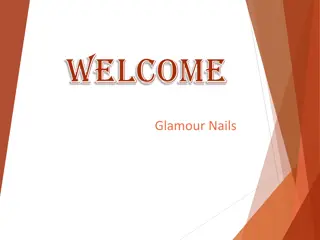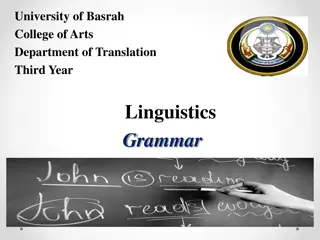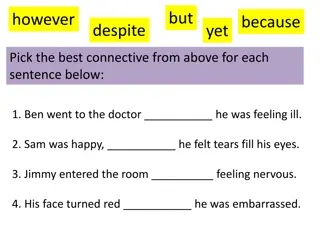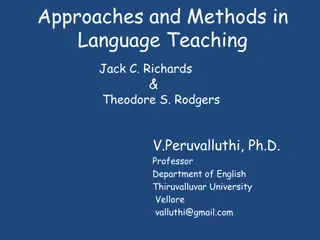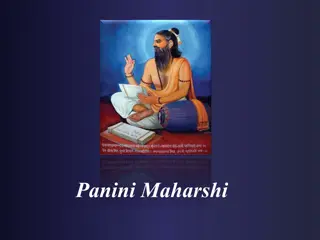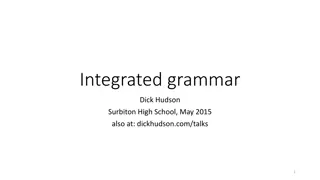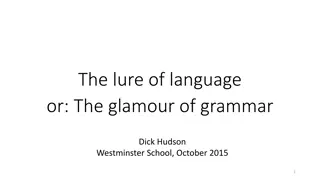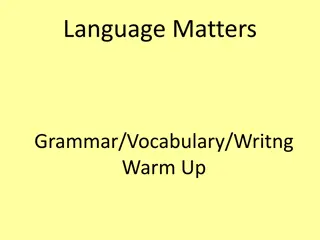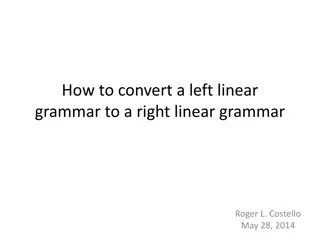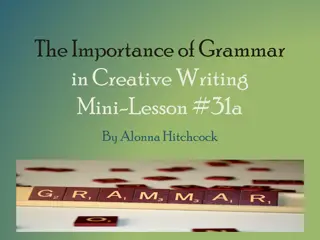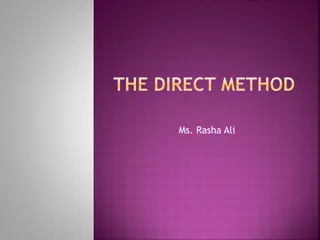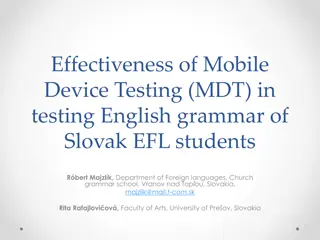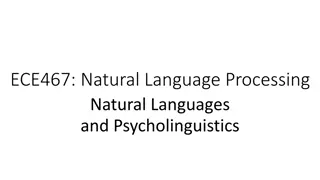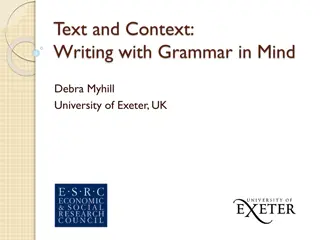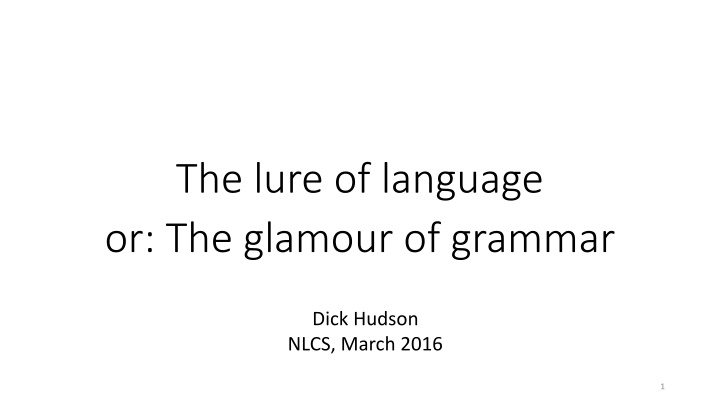
The Lure of Language or the Glamour of Grammar
Delve into the fascinating journey of language exploration through the eyes of Dick Hudson, as he shares his personal story of being enticed by the beauty of linguistics, etymology, language change, grammar, and more. Explore the historical origins of words like "glamour" and "treacle," along with insights into language evolution and the interplay between form, meaning, and culture. Uncover the transformative power of language in shaping new languages and understanding the intricate nuances of linguistic development.
Download Presentation

Please find below an Image/Link to download the presentation.
The content on the website is provided AS IS for your information and personal use only. It may not be sold, licensed, or shared on other websites without obtaining consent from the author. If you encounter any issues during the download, it is possible that the publisher has removed the file from their server.
You are allowed to download the files provided on this website for personal or commercial use, subject to the condition that they are used lawfully. All files are the property of their respective owners.
The content on the website is provided AS IS for your information and personal use only. It may not be sold, licensed, or shared on other websites without obtaining consent from the author.
E N D
Presentation Transcript
The lure of language or: The glamour of grammar Dick Hudson NLCS, March 2016 1
How I was lured by the glamour of language 1. Me 2. Etymology 3. Language change 4. Grammar 5. Language analysis 6. Generative linguistics 7. Psychological modelling 8. Educational linguistics 2
1. Me Born 1939 into a very monolingual England. Secondary school: Grammar school = school that taught grammar I loved it! Same teacher taught Latin and English, with grammar. A-levels: French, German, Latin. BA: Modern and Mediaeval Languages, with some Linguistics PhD: The grammar of an unwritten African language Next 50 years: Researching language structure and getting frustrated by UK language education 3
2. Etymology GLAMOUR what s its history? or: Where does it come from? or: Why do these sounds have this meaning? or: How is this word related historically to other words? Answer: It comes from GRAMMAR! How on earth did that happen? History: Grammar was central to education (think grammar school ) So Grammar education wizardry, magic And gl....? Compare glint, gleam, glitter, glance, ... 4
TREACLE 5
TREACLE in the Online Etymological Dictionary Proto-Indo- European mid-14c., "medicinal compound, antidote for poison," from Old French triacle "antidote, cure for snake-bite" (c. 1200), from Vulgar Latin *triacula, from Latin theriaca, from Greek theriake (antidotos) "antidote for poisonous wild animals," from fem. of theriakos "of a wild animal," from therion "wild animal," diminutive of ther (genitive theros) "wild animal," from PIE root *ghwer- "wild" (see fierce). Sense of "molasses" is first recorded 1690s (the connection may be from the use of molasses as a laxative, or its use to disguise the bad taste of medicine); that of "anything too sweet or sentimental" is from 1771. Related: Treacly. 6
So what? Words change meaning e.g antidote for snake-bite > antidote for poison Meanings aren t natural !! They also change their forms, independent of meaning e.g. triacula > triacle (cf singula > single) At each stage the form and meaning are both tightly related to: other forms and meanings culture We can ask why? and if we re lucky we ll find an answer 7
3. Language change makes new languages English German Latin French father Vater [f t r] pater p re mother Mutter mater m re brother Bruder frater fr re sister Schwester soror soeur 8
generations guessed PIE From Proto-Indo-European to us *gwe:n woman -3,500 0 Greek /gyne:/ woman -500 120 borrowed cwen woman 160 +600 English gynaecologist misogyny +2,000 200 queen 9
The Great Vowel Shift 1350-1700 before after bite /i / /a / meet /e / /i / meat / / mate /a / /e / out /u / /a / boot /o / /u / boat / / / / 10
So what? Long vowels changed, but short vowels didn t. That s one of the reasons why English spelling isn t phonetic Sometimes the spelling shows the links between long and short pairs /i:/ ~ / / deep ~ depth (weep ~ wept, clean ~ cleanse) same vowel-letter because they used to have the same vowel-sound /ai/ ~ /i/ wide ~ width (five ~ fifth, fifty, hide ~ hidden) Ibiza = /aibi / 12
4. Grammar The French football team me te se nous vous le la les lui leur y en 13
Why I liked it ungrammatical Very exotic, but also very clear Paul donne le frommage Marie. Paul gives the cheese to Mary Paul me le donne. Paul gives me it. But not *Paul donne le me. *Paul le me donne. Paul le lui donne. Paul gives her it. But not *Paul lui le donne. 14
Other languages with special clitic pronouns Spanish, Italian Modern Greek Serbo-Croat Arabic ? the Mediterranean languages i.e. large-scale borrowing of abstract grammatical patterns 15
And English? Non-pronouns: I lent a student that book. indirect object + direct object *I lent that book a student. NOT: * direct + indirect or: Add to if direct + indirect I lent that book to a student Pronouns: I lent him it. indirect + direct I lent it him. direct + indirect - NB This is ok with pronouns! 16
From Nesfield, Manual of English Grammar and Composition, 1898!!! 5. Language analysis In 1952 (age 12) I learned how to analyse a sentence I. Subject 2. Predicate Nominat- ive or equivalent Enlarge- ment of nominative Finite verb Completion of finite verb Extension of finite verb object comple- ment From Lily 1542, and the class before ... master (1) the (2) new put into good order soon. he asked (1) me (2) a rude question without any necessity. 17
But then I got to analyse a whole language: Beja (Sudan) First I found some speakers They don t write their language. 18
: = long Then I asked how to say ... The sister eats. The man eats. The sister sees the man. The man sees the sister. tu:kwa tamtini u:tak tami:ni The u: +t- feminine u: > o: accusative. tu:kwa o:tak rhi:ni u:tak to:kwa rhitni the sister sister tu:kwa/to:kwa kwa tak The verb present = i:ni i: > it if subject is feminine. the man eats sees man eat see u:tak/o:tak tami:ni/tamtini rhi:ni/rhitni tam rh Word order: subject + object + verb 19
You could do it too! uklo.org Try the UK Linguistics Olympiad! a. ilaga diwi:ni The male calf is sleeping. b. do:ba:b rhitni She sees a bridegroom. c. gwibu It is a mouse. d. o:me:k ki:ke He is not the donkey. e. tu:ka:m b ata The female camel lay down. f. iragad winu The leg is big. 20
6. Generative linguistics A generative grammar is one that is totally explicit, leaving nothing to be filled in by the user generates all (and only) the sentences of the language. The idea was first popularised by Noam Chomsky (1957) Most linguists accept the aim but many reject Chomsky s methods and claims. 21
A Mickey-Mouse generative grammar of English isa adjective noun verb hate boys like small big girls modifier subject object ? verb adjective ? ? noun subject modifier object E.G. big boys girls like 22
7. Psychological modelling How do we represent language in our minds, as knowledge? The rest of knowledge is a network with lots of indiscriminate associations that can be tested experimentally and with errors So maybe language is a network too that would explain why we make mistakes. 23
Speech errors Speech errors happen because network neighbours influence one another through spreading activation: Radio 4: She s an operano merging two adjacent planned words: opera soprano Spoonerisms: You ve tasted a whole worm confusing two non-adjacent planned words: wasted a whole term Malapropisms: ... weapons of mass production (Bush Senior) confusing two phonologically related words: production for destruction Meaning confusion: tennis bat confusing two semantically related words: bat for racquet. 24
So what? Language is a vast network of concepts: words sounds meanings etc We search for a target concept by activating its properties and hoping that the activation will converge and produce a winner. Most of the time, it works well! and fast. But sometimes it fails, and we make a mistake. 25
8. Educational linguistics What about education? Education is all about building the language network: learning new academic words and constructions learning what they mean learning how the words and concepts interrelate learning the conventions for using them We also learn the mental skills needed for complex language complex ideas fast real-time communication problem-solving 26
In an ideal world ... Pre-school children start learning their own home language: 5,000+ words, lots of grammar. Primary children learn how this language network works: vocabulary as well as grammar and how to write it - even the non-standard bits Then they learn Standard and academic English ... and understand how it s different from their home language. Then they learn Foreign and understand how it s different from English and enjoy learning languages in later life. Then some deepen their understanding at university and become school teachers 27
In the real world Primary children don t study their own language s structure. Most people have no idea how fascinating their language is. In state schools, foreign languages are deeply unpopular and dying. English teachers and foreign-language teachers rarely collaborate. Most university language departments teach no language. So most teachers have never learned about language. But there are shining exceptions showing what s possible. Your country desperately needs good language teachers! 28
What I didnt talk about How your language influences your thinking e.g. spirit, nature. How language shows social relations e.g. Dad and Mum are names, and for some son is too. but daughter isn t. How learning a second language improves your mind. How linguistics can have an Olympiad without being taught. And much, much more besides! 29
In short, Language is really interesting. Linguistics is the Maths of the humanities and social sciences. You can study language at university ... but beware of literature-only courses! 30
Thanks If you want to watch this show again, you can download it: dickhudson.com/talks 31



